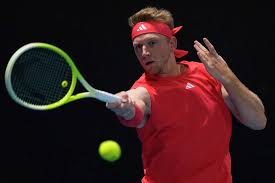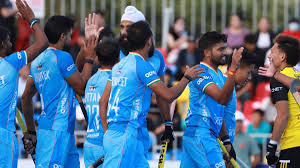Neeraj Chopra’s adductor is fine, he’s doing intense training now: coach Bartonietz
New Delhi, Jul 21 (PTI) The adductor niggle that has troubled Neeraj Chopra in the past couple of months “is fine” now and the reigning Olympic champion has entered the high intensity phase of his Paris preparations, his German coach Klaus Bartonietz told PTI, dismissing concerns surrounding the Indian star’s fitness.
The 26-year-old Chopra, who scripted history by winning the javelin throw gold at the Tokyo Olympics, is once again the country’s best bet for a top podium finish in the Paris Games beginning on July 26.
But his season has been far from perfect in terms of fitness. Bartonietz, however, insisted that things are back on track.
“Everything is according to plan. At the moment, no issue with that (adductor niggle), it’s fine, it looks good, hoping to remain like that till the Olympics,” the coach, who has been with Chopra for close to five years, told PTI in an exclusive interview from Antalya, Turkiye where they are currently based for training.
“It’s just over two weeks left in the Olympics, so the intensity of training is high. He is having full throwing sessions.”
Chopra withdrew from Ostrava Golden Spike on May 28 as a precautionary measure after he felt “something” in his adductor (group of muscles located on inner thighs). He made a strong comeback by winning gold at the Paavo Nurmi Games in Finland on June 18 with a throw of 85.97m.
He opted out of the Paris Diamond League on July 7, insisting that the event was never a part of his competition calendar this year.
Chopra’s competition day is just two weeks away with the qualification round scheduled on August 6.
Asked about the training routine of Chopra, Bartonietz said, “We have sessions of sprinting, jumping or throwing or weightlifting alternately for activation in the morning. Two sessions, one in morning and one in evening, two to two-and-a-half-hour long each.
Bartonietz said the approach is nearly the same as the one adopted before the Tokyo Olympics.
Chopra has maintained that he is focusing more on training than competitions this time. He is working on strengthening his blocking leg to mitigate pressure on his groin.
“Yes. Generally, javelin throw is all about it (having fast runway and blocking well). It’s very hard to throw far with a poor runway. More the energy you bring with that, the better it is,” said the German bio-mechanics expert.
“Three events before Olympics not disadvantage”
==============================
Chopra competed in five events before Tokyo but in only three ahead of the Paris Games. His coach does not see anything wrong in cutting down competitions.
“You can compete in many events or not, it’s tough to say what is enough (number of events). It depends on the situation. Jan Zelezny (Czech legend and world record holder) says he does not compete in too many events (just two before 1992 Olympics where he won gold).
“Competitions sometimes disrupt preparation and you start all over again. Competing in high class events can become risky also. Travelling too much with logistics, with javelins around the world, is also not good.
“So, it’s fine, he has prepared and trained well.”
Asked about Chopra opting out of the Paris Diamond League on July 7, Bartonietz said, “There were some minor issues, not worth risking by going there.
“The venue (of Paris Diamond League) was also not the Olympic stadium (where Chopra will compete on August 6 and 8) anyway, so we decided not to take chances.”
Not safe to predict medal
================
None of the top javelin throwers have performed exceptionally well this season and Bartonietz suggested that the competition could be wide open in the Olympics. As usual, he would not even predict Chopra’s chances.
“Olympics is a high-stakes and high-pressure situation and anything can happen. Guessing a medal on the basis of statistics is difficult.
“All the top throwers are training their best, they want to give their best in Paris and win a medal. Just like them, we can also claim that Neeraj can win. These claims (of medal chances) can be biased and can bungle up also,” he pointed out.
German teenager Mex Dehning is the only one to have thrown more than 90m this year, and Bartonietz said it all boils down to momentum.
“An 88m throw may not be enough in the Olympics for a medal but it can happen with an 85m also, you never know. It is like a game of poker and on some days you can throw far if you have momentum.”
Apart from Czech Republic’s Jakub Vadlejch (silver medal winner in Tokyo Olympics), Julian Weber of Germany and two-time former world champion Anderson Peters of Grenada, Bartonietz also picked Oliver Helander of Finland as a medal contender.
The Olympic Stadium in Paris will have purple-coloured Mondo tracks, which experts believe give faster timings in races.
Asked if Neeraj will gain from the track on the runway, Bartonietz said, “It’s basically for sprinters (to have better timings). It may be good for Neeraj also, of course, but it’s for all javelin throwers, it can be fast. But it is a matter of full use of the speed.”






